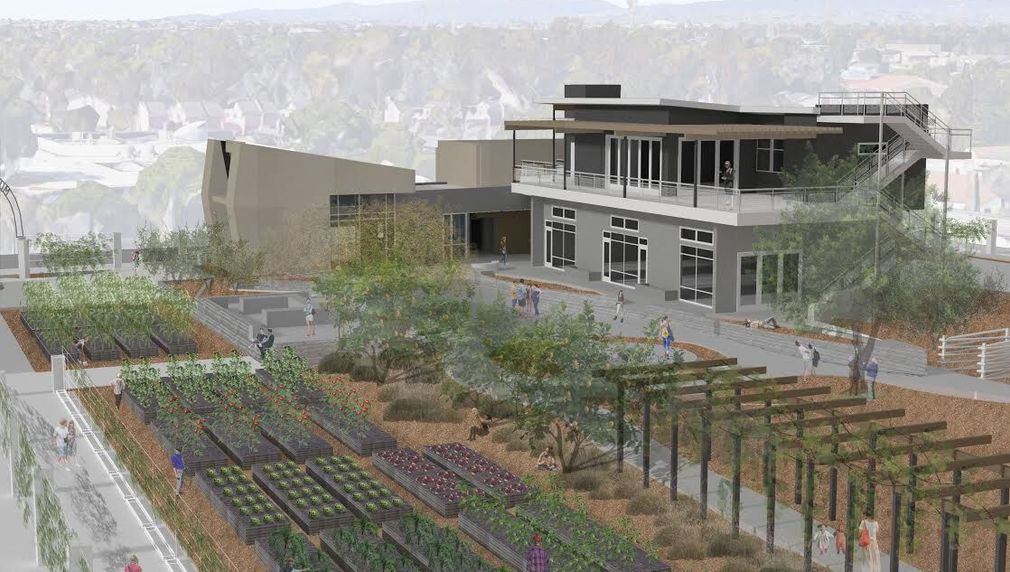MudTown Farms: Growing Urban Farmers in Watts
WLCAC’s MudTown Farms trains Watts residents in urban farming for economically and environmentally sustainable careers. Our hands-on course includes subsidized apprenticeships, land access, cultural heritage, business networks, farm planning, and social safety net supports. New urban farmers will use self-determination and entrepreneurship to address food insecurity, food quality, and unemployment for themselves, their families, and the community.

In which areas of Los Angeles will you be directly working?
South LA
What is the problem that you are seeking to address?
With 37% of all public housing in the City of LA and only 2 supermarkets, Watts is a food desert where residents (about 2/3 Latinx, 1/3 Black, and nearly ½ immigrants) have low access to food, employment, and education. Within a ½ mile radius of MudTown Farms, the median household income is half the county average, and 41% of residents live in poverty. Earlier community meetings revealed residents’ desires to learn more about urban farming, and our current gardening students aspire to go deeper with additional training in business, sustainable food systems, and best practices for maximizing food production. To address food insecurity, food quality, and unemployment, Watts residents need skills, knowledge, supports, and connections. To be viable, career pathways should include education, built-in business connections, subsidized launchpads, and social safety net supports. Options for both employment and entrepreneurship can offer self-determination and community business opportunities.
Describe the project, program, or initiative that this grant will support to address the problem identified.
WLCAC’s 1960s roots include farming under power lines in Watts and on remote ranches that supplied senior nutrition programs and social-enterprise markets. Building on this agricultural history and our track record of serving Watts residents, we will offer urban farmer training that incorporates cultural heritage, business networks, economic viability, nutritional sufficiency, and social safety net supports. Our newest site, 2.5-acre MudTown Farms, boasts a multipurpose building, greenhouse, orchard, aquaponics, composting, flower beds, and vegetable cultivation on historic, fertile, unbuilt and uncontaminated farmland. MudTown Farms’ innovative urban farming course will include subsidized apprenticeships, land access, and customized farm business planning. Urban farming offers both individual and community economic improvement by reducing food costs, improving diet quality, and producing a good return on investment. Even with barriers of limited language, education, and startup capital, Watts residents can gain useful, employable skills in a growing business sector, with scalable entrepreneurial options. Coordinated individual urban farmer action can increase the entire community’s capacity for food production, food access, employment, and self-determination, contributing to both economic and environmental sustainability. With this training and MudTown Farms’ continued support, new urban farmers can regrow the market garden economy that sustained earlier Watts residents.
In what stage of innovation is this project, program, or initiative?
Pilot or new project, program, or initiative
Approximately how many people will be impacted by this project, program, or initiative?
Direct Impact: 20
Indirect Impact: 80
Describe how Los Angeles County will be different if your work is successful.
Through deep engagement, this innovative program will change the employment and income trajectory for significantly disadvantaged individuals, launching them into fulfilling, sustainable careers as urban farmers. Learning skills, making career connections, practicing entrepreneurship, and gaining food sovereignty will empower individuals who are poorly served by existing education and employment options. Furthermore, individuals who receive urban farmer training, career guidance, and subsidized apprenticeships and land access will improve food security and health for their families and community. Creating career paths, business networks, and a support system for urban farming careers promotes both economic and environmental sustainability in a neighborhood lacking these benefits. With the endorsement of our new Advisory Council, MudTown Farms’ training credential will set local urban farmer training standards and smooth the way for students’ employment and entrepreneurial credibility.
What evidence do you have that this project, program, or initiative is or will be successful, and how will you define and measure success?
Fruitful recruitment, student retention, and gains in farm/business knowledge and skills will demonstrate successful training. Program success includes 15-20 urban farmers (at least 70% limited resource, at least 90% socially disadvantaged) completing training, 10 completing apprenticeships, and 5 farming on subsidized plots. Income gained from employment and/or entrepreneurship will demonstrate individual economic success. Economically and ecologically sustainable urban farming ventures will demonstrate successful farm plans. Student pre- and post-program self-assessment of personal and family food insecurity and healthy food access will measure health improvements. An Advisory Council of at least 5 individuals will demonstrate connections to wider LA-area farm/food ventures. Active, trained farmers, continued programming, Latinx and Black community awareness of new career options, and access to healthy food will demonstrate longer-term success.
Which of the LIVE metrics will you impact?
Access to healthy food
Food insecurity
Poverty rate
Indicate any additional LA2050 goals your project will impact.
LA is the best place to LEARN
LA is the best place to CREATE
LA is the healthiest place to CONNECT